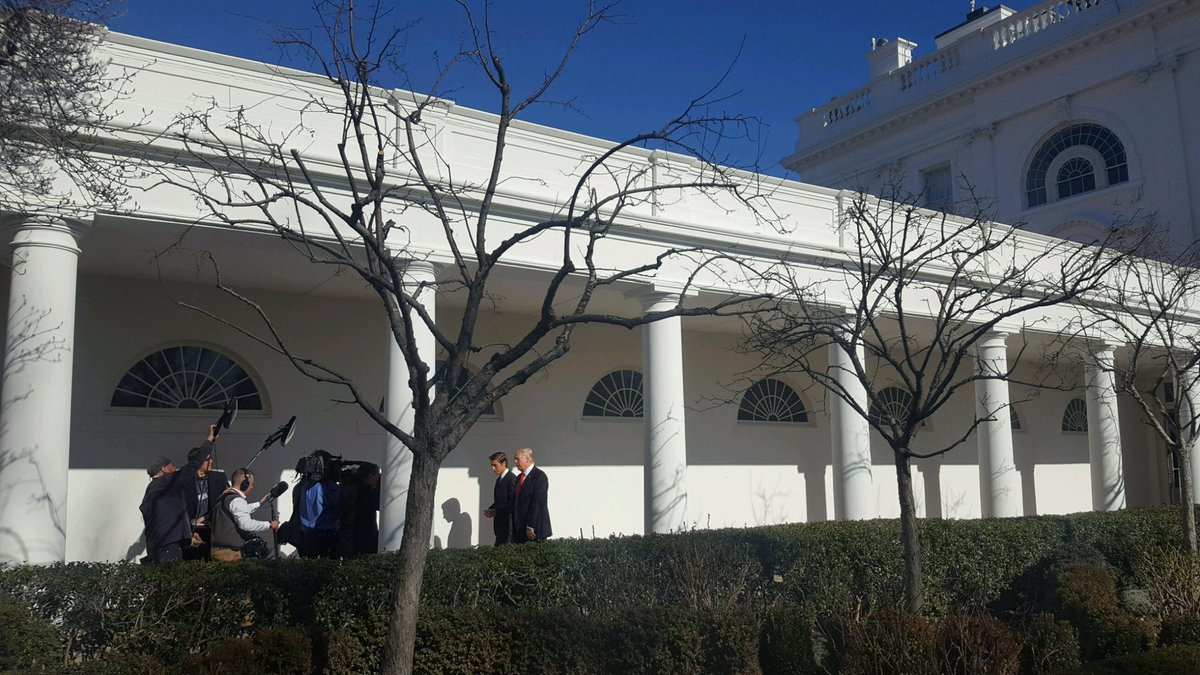The Law of Leaks
The President is having a bad week. His National Security Adviser has resigned in disgrace as accusations of improper contacts between then-Candidate Trump and his associates embroil the already chaotic and dysfunctional White House. With mounting calls for bipartisan congressional investigations, a steady stream of media scoops regarding the ongoing investigation adds ever more fuel to the fire. Wherever it leads, the story of “the Russia Connection” will not be going away anytime soon.

Published by The Lawfare Institute
in Cooperation With

The President is having a bad week. His National Security Adviser has resigned in disgrace as accusations of improper contacts between then-Candidate Trump and his associates embroil the already chaotic and dysfunctional White House. With mounting calls for bipartisan congressional investigations, a steady stream of media scoops regarding the ongoing investigation adds ever more fuel to the fire. Wherever it leads, the story of “the Russia Connection” will not be going away anytime soon.
Amidst the chaos, President Trump has found the “real scandal.” Surprisingly, Trump insists the scandal is neither the shocking onslaught of reports of contacts between his own campaign and intelligence agents of a hostile foreign power, nor his own refusal to provide information regarding his financial interests in Russia. Instead, the President once again takes aim at our own intelligence services.
The real scandal here is that classified information is illegally given out by "intelligence" like candy. Very un-American!
— Donald J. Trump (@realDonaldTrump) February 15, 2017
Specifically, he intimates that the NSA and FBI have given classified information to the “failing” New York Times and Washington Post—both outlets that have run bombshell stories with sourcing from former and current government officials.
Heated public rhetoric regarding leaking is common from both sides of the aisle, and it masks an ecosystem that is, in its own way, rather permissive about leaks. Still, Trump’s accusation raises a number of concerns. First, the President makes these accusations despite not knowing the actual source of these leaks. At least some of the information seems to be coming from his own White House. And nothing that has come to light is the kind of material that only the FBI or NSA would be aware of. Indeed, there is no particular reason to assume that any of these leaks are intelligence community leaks, rather than leaks by current and former White House officials with the knives out for Flynn.
Second, these tweets suggest that the President is more interested in hunting down leakers than in getting to the bottom of extremely serious allegations against his own administration. Whether Trump’s comments represent an intentional deflection or merely reflect misaligned priorities, most people can agree without defending leaking that the leaks are probably not the “real scandal” here.
Finally, and perhaps most worryingly, the President’s statement seems to signal an intention to use the pretense of leak investigations to engage in political retaliation. As Tim Edgar noted yesterday, the President is showing an instinct here that is not all that dissimilar from the events that set Watergate in motion.
Richard Nixon’s National Security Advisor, Henry Kissinger, requested wiretaps on White House staff to uncover news leaks involving classified information. The “White House wiretaps,” as they were known, were reviewed by Senator Frank Church’s investigative committee. There have long been suspicions that Kissinger, who received the FBI transcripts, requested the wiretaps not for security purposes—which were not his purview—but instead to keep tabs rivals and to gain an advantage in policy disputes.
Trump’s leak problem is not confined to the investigations into his associates’ contacts with Russia, including the investigation of Flynn. A torrent of leaks has plagued the administration from its earliest days—and while leaks are nothing new, the volume of leaks from the Trump Administration (White House and otherwise) seems unprecedented. On Monday, The Washington Post reported that President Trump, “[u]pset about damaging leaks of his calls with world leaders and other national security information,” has ordered an internal investigation of administration leaks. And last week, a senior White House official told the Wall Street Journal that the administration is investigating leaks of details of President Trump’s ham-handed calls with foreign leaders, adding: “Some of [the leaks] are done in a way that the release of that info is clearly a breach of a lot of protocols and laws.” The unnamed official didn’t specify which laws or protocols, and while many leaks have certainly been embarrassing to Trump, many also do not implicate classified information.
This newest round, however, certainly involves unauthorized disclosures of classified information. Yesterday, in musing about the aftermath of Flynn’s departure, Eliot Cohen riffed on Trump as Captain Ahab: “[T]he White House will be the scene of knife fights below decks and shouted orders and counterorders on the quarterdeck. And at the end of the day, Trump, like Captain Ahab, will probably remain topside, pursuing whatever Moby Dick his imagination has just conjured up. That story did not end particularly well for all aboard.”
To borrow Cohen’s theme, the Trump administration is riddled with leaks from bow to stern, and the last 24 hours have shown us that persistent breaches may very well sink this ship. The constant flow of embarrassing information paints a fractious and incompetent White House, an unstable and immature Commander-in-Chief, and near-daily blunders both diplomatic and domestic. And beyond the daily embarrassment, the persistent leaks reveal ongoing counterintelligence investigations. The hull is taking on water, and yesterday the Administration sacrificed its first crewmember in a desperate maneuver to stay afloat.
These leaks both raise genuine security concerns and also have grave political implications for the future of the administration itself. This heightens the risk of a Kissingeresque situation or one in which facially legitimate leak investigations become a tool of political retaliation. In defending against this risk—or at least identifying the existence of politically-motivated leaks investigations—it is important to understand the substantial complexity of the law and practice of investigating and prosecuting leaks.
To that end, below is an examination of the laws surrounding government leaks, how the White House might seek to investigate and remedy its major information control failings, and what the nature of leak investigations and enforcement mean for executive information control.
The Basic Legal Framework
On the enforcement side, the administration might have a range of criminal statutes and enforceable legal obligations to use (or threaten to use) to stem the tide of leaks.
Criminal Statutes
The cornerstone of anti-leak law is a provision of the Espionage Act of 1917, codified at 18 U.S.C. § 793, which criminalizes improperly accessing, handling, or transmitting “information respecting the national defense” with the intent of injuring the United States or aiding a foreign nation. Under Supreme Court precedent, “national defense information” is broadly defined and includes sensitive information relating not only to the military, but also to national security more generally. As Professor Patricia Bellia notes, while “the phrase ‘national defense information’ used throughout §§ 793 and 794 is not coterminous with the phrase ‘classified information,’” nevertheless “a document’s classification status could provide evidence that the document was closely held or that the document, if transmitted, would injure the United States or aid a foreign nation.”
Later amendments added 18 U.S.C. § 798, criminalizing the disclosure of various kinds of classified information including information “concerning the communication intelligence activities of the United States or any foreign government.” Section 798 contains no explicit intent requirement: in order to violate that provision, one need only “knowingly and willfully” communicate the information. Notably, this is the provision of the law which FBI Director Comey famously determined Hillary Clinton did not violate, despite demands for prosecution from President Trump and other political opponents. While the law facially allows prosecution for mere gross negligence, in reality it does seem to require some degree of intent.
The other law that often forms the basis of leak prosecutions is the general theft statute at 18 U.S.C. § 641. This provision makes it a crime to steal, sell, or convey “any record, voucher, money, or thing of value of the United States or of any department or agency thereof.” The federal courts of appeals differ on applying this statute to leaks of government information: while all of the circuits recognize the government’s property interest in records and documents (so if you physically steal actual records, the statute most certainly applies), some refuse to extend that to the underlying information contained in the records.
Other laws criminalize more specific leaks. The Intelligence Identities Protection Act, for instance, makes it a crime to reveal the identity of covert agents. Former CIA officer John Kiriakou was indicted under this act and the Espionage Act for leaking classified information relating to the CIA’s detention and interrogation program. He pled guilty in 2012 and was the first CIA officer to serve a prison sentence for leaking. This is also the substantive offense at the heart of the Plame affair, discussed below.
And beyond those substantive offenses criminalizing leaking itself, there’s the crime of making false statements. Under 18 U.S.C. § 1001, it is a felony offense to “knowingly and willfully . . . make[] a materially false” statement in the course of an investigation by any branch of the federal government. So if you lie about a material fact in the course of a leak investigation (see more below on investigations), you’ve committed another substantive felony, and one that is very frequently prosecuted.
This provision is used far more frequently than the others, in part because of the aggravating nature of lying to law enforcement and in part because the offense is easier to prove. As the saying goes, it’s not the crime, it’s the coverup.
For example, the high-profile leak investigation of the naming of covert CIA operative Valerie Plame might have involved the Intelligence Identities Protection Act, but prosecutors ended up indicting Scooter Libby, Vice President Cheney’s chief of staff, on multiple counts of obstruction of justice, perjury, and making false statements. As The Washington Post reported at the time, the U.S. Attorney on the case “noted that proving illegal disclosure of classified information under various federal statutes is difficult,” in part because many require proving specific knowledge or intent.
Nondisclosure Agreements
Beyond threat of criminal sanction, courts have enforced government nondisclosure agreements aimed at protecting sensitive information. Regular Lawfare readers are aware of prepublication review: under the terms of nondisclosure and confidentiality agreements, when government employees return to the private sector, they often must submit anything to be published for review to ensure the writing does not contain sensitive or confidential government information. In Snepp v. United States, the Supreme Court found these agreements to create enforceable fiduciary duties. The Court specifically noted that whether the information was classified was not determinative of whether Snepp violated his obligation to submit the material for prepublication review:
Whether Snepp violated his trust does not depend upon whether his book actually contained classified information. The Government does not deny—as a general principle—Snepp’s right to publish unclassified information. Nor does it contend—at this stage of the litigation—that Snepp’s book contains classified material. The Government simply claims that, in light of the special trust reposed in him and the agreement that he signed, Snepp should have given the CIA an opportunity to determine whether the material he proposed to publish would compromise classified information or sources.
Jack Goldsmith and Oona Hathaway have argued that the unclear scope, mess of regulations, and vast agency discretion makes prepublication review susceptible to dysfunction and abuse and “results in pervasive and unjustifiable harms to freedom of speech.” They argue these “restrictions on commentary and criticism about government policies and practices pose an intolerable cost to our democracy.” (Read their Lawfare posts on prepublication review and reform here, here, here, and here.)
Leak Investigations
Typically, classified information leak investigations are overseen by DOJ’s National Security Division and conducted by the FBI. In a 2006 interview, David Szady, former assistant director for counterintelligence at the FBI, outlined how leak investigations proceed. First, the “victim agency” (the owner of the classified material) refers the matter to the Department of Justice, who decides whether to open an investigation. Importantly, investigations are opened only when the leaked information is accurate—that is, the mere fact of an investigation is an indirect confirmation of the accuracy of the leak. DOJ then sends the file to the FBI, who conducts the actual investigation, typically reviewing documentation and signals intelligence but sometimes through interviews and polygraphs.
In the post-Watergate era, leak investigations conducted by the White House rather than a law enforcement organization are viewed suspiciously as possible instances of political retaliation rather than dispassionate law enforcement operations. When the George W. Bush and Obama administrations came under fire for leaks of classified information, both endorsed the practice of law-enforcement-led investigations. The Bush Administration appointed an independent special prosecutor to investigation the Plame affair. And when the Obama Administration faced bipartisan criticism for leaks of classified information related to counterterrorism operations, the National Security Division of the Justice Department recused itself from the investigation to avoid the appearance of conflicts.
Aggressive leaks investigations have dangers that go beyond mere political impropriety, as well. Troublingly, The Washington Post reported that Trump staffers “are so fearful of being accused of talking to the media that some have resorted to a secret chat app—Confide—that erases messages as soon as they’re read.” (Slate has more on the use of Confide.) Conducting official White House business in this way almost certainly violates the Presidential Records Act, which requires preservation of any correspondence or records not only of White House staff, but also of any individual in any part of the Executive Office of the President, including the National Security Council.
How Leakiness Can Be Exploited by the White House
In The Leaky Leviathan, David Pozen writes that leaking is both commonplace in Washington and, echoing James Reston’s 1946 observation, that it most often comes from the top: “The ship of state, one often hears, is the only known vessel that leaks from the top—starting, that is, from the White House itself.” But Pozen and many others have observed that despite the broad laws and mechanisms described above, anti-leaking law has been notably underenforced. “In formal terms this legal regime looks forbidding, draconian. In practical terms, as a frustrated intelligence professional once put it, the system amounts to ‘permissive neglect.’”
Pozen posits that underenforcement may be historically explained at least in part by the benefits the Executive reaps from a system that tolerates leaks: the preservation of “a robust ability to use the media to convey anonymous statements that serve administration ends—that is, to plant.”
While the Trump administration has clearly been more damaged by leaks than served—and is seemingly too incompetent to exploit leaking in any systematic way—Pozen’s insight provides a valuable lens for the moment. Take the slow-burning Flynn saga. Shane Harris at the Wall Street Journal first reported on inauguration weekend that Flynn had been under U.S. counterintelligence investigation relating to his phone calls with the Russian ambassador. Although several news organizations confirmed that reporting, The Washington Post reported the following day that the FBI had reviewed Flynn’s calls but “found nothing illicit.” The fact that the administration is leaking from everywhere provided the very conditions by which (presumably) the administration was able to kill the story for several weeks with one “leak” in the other direction.
Whereas prior administrations have routinely used the permissive leaking environment to disclose accurate, though classified, information for political or strategic gains, we should be genuinely worried that the Trump administration will use it to sow chaos and undermine leaks of accurate information by planting lies. Because this administration is willing to lie, the phenomena Pozen describes about leaks and plants takes on new significance: rather than exploiting permissive leaking’s cover for plants of factual information, the administration might exploit it to obscure the truth.
Understanding the Root Cause
None of the above accounts for why we have seen such an overwhelming number of leaks emerge from the Trump administration, both the White House and federal agencies. One explanation is that the groups of potential leakers now perceive a new threat. In his article, Pozen describes Stephen Hess’s motivational typology of leaks:
In motivational terms, Hess explained, the main variants include: the ego leak, meant to satisfy the leaker’s ‘sense of self-importance’; the goodwill leak, meant to curry favor with a reporter; the policy leak, meant to help, hurt, or alter a plan or policy; the animus leak, meant to settle grudges or embarrass others; the trial-balloon leak, meant to test the response of key constituencies, members of Congress, or the general public; and the whistleblower leak, meant to reveal a perceived abuse and, unique among the list, ‘usually employed by career personnel.
While these motivations may overlap and resist disentangling, it is telling that less than a month into the new administration, one could easily and plausibly list dozens of leaks that might fall into each of these categories. Two weeks ago, The Washington Post speculated on the motivations for the deluge of leaks which seemed to cover any number of motivational typologies. Pozen suggests that although leakiness is “often taken to be a sign of institutional failure,
[i]t may be better understood as an adaptive response to key external liabilities—such as the mistrust generated by presidential secret keeping and media manipulation—and internal pathologies—such as overclassification and fragmentation across a sprawling bureaucracy—of the modern administrative state.
It may be true in a functional system that leaks ease secrecy restrictions to mitigate issues of public trust. With the Trump administration, however, the liability is not external, with the leakers aiming to fortify the President and federal bureaucracy against public perceptions of illegitimacy. Instead, the bureaucracy mistrusts and fears President Trump himself.
Until Trump can remedy his problem of credibility and faith, the truth will find a way.






